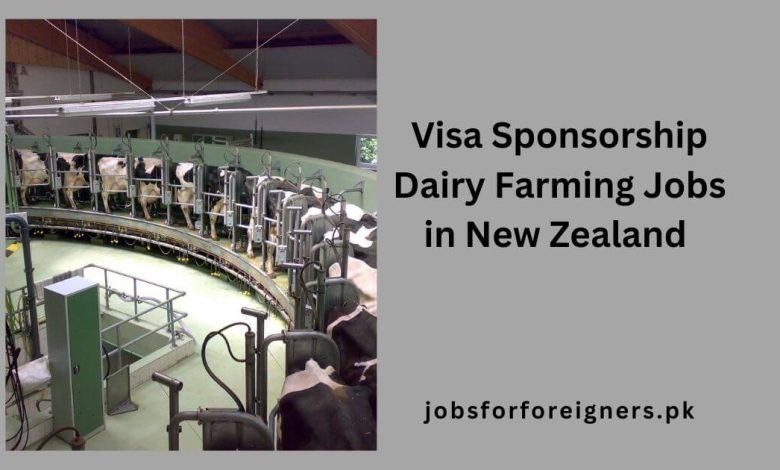Visa Sponsorship Dairy Farming Jobs in New Zealand 2025

Dairy farming jobs in New Zealand for 2025 with visa sponsorship offer excellent opportunities for international candidates seeking to work in one of the world’s most productive agricultural sectors. These roles—ranging from farm assistants and dairy workers to more experienced herd and assistant manager positions—often include full-time or seasonal employment with competitive wages (typically between NZD 24–30/hr) and employer-backed visa support under schemes like the Accredited Employer Work Visa
Check Also: Supermarket Jobs in New Zealand – Visa Sponsorship
Job Details:
- Position: Dairy Farm Worker
- Location: Various locations across New Zealand
- Job Type: Full-time, Part-time, Permanent, Contract
- Visa Sponsorship: Yes
Requirements:
- Experience in dairy farming or a related agricultural field is preferred.
- Skills in animal care, milking processes, and farm equipment operation.
- Basic knowledge of disease diagnosis and animal care is essential.
- Proficiency in the English language for effective communication.
Benefits:
- Job Security:
The dairy industry plays a vital role in New Zealand’s economy, ensuring consistent demand for workers. - Competitive Salaries:
Positions offer attractive salaries, with potential bonuses and overtime pay. - Training & Development:
Many farms provide hands-on training in farm management and animal husbandry. - Practical Experience:
A great opportunity for individuals who enjoy physical, outdoor work. - Career Growth:
Opportunities for farm management, ownership, or specialization in agronomy and animal health. - Work-Life Balance:
Flexible work schedules available, particularly in off-peak seasons. - Community Engagement:
Collaborative work environments encourage teamwork and networking. - Cultural Experience:
A chance to experience New Zealand’s unique farming culture and lifestyle. - Employee Benefits:
Some employers provide accommodations, health insurance, and retirement plans.
Key Responsibilities:
- Animal Care: Ensuring the health and well-being of dairy cows.
- Milking Process: Assisting in the efficient and hygienic milking of cows.
- Calving: Providing care to newborn calves during the birthing season.
- Farm Maintenance: Upkeep of farm equipment, fencing, and infrastructure.
- Feeding & Nutrition: Managing feeding programs for livestock.
- Health Monitoring: Working with veterinarians to address animal health issues.
- General Farm Duties: Performing various day-to-day tasks as needed.
Salary Expectations:
- Entry-Level Workers: NZD 45,000 – NZD 55,000 per year
- Experienced Workers: NZD 55,000 – NZD 75,000 per year
- Supervisory Roles: NZD 70,000 – NZD 90,000 per year
Available Positions in Dairy Farming:
- Agricultural Assistant: Assists in farm operations and animal care.
- Stock Manager: Manages dairy cattle for optimal health and productivity.
- Farm Manager: Oversees overall farm operations and strategy.
- Calf Rearer: Specializes in calf care and development.
- Milker: Responsible for the milking process and machine maintenance.
- Feed Manager: Ensures proper nutrition and feeding schedules for livestock.
- Veterinary Technician: Provides animal healthcare services.
- Tractor Operator: Operates machinery for farm maintenance and feeding.
- Fencing Contractor: Handles the construction and repair of farm fencing.
- General Farm Worker: Performs a variety of essential farm duties.
Application Process:
- Prepare Your CV: Highlight relevant experience and qualifications.
- Write a Cover Letter: Customize your application to demonstrate your suitability for the job.
- Apply Online: Submit applications through job portals or company websites.
- Follow-Up: Contact employers to express continued interest.
- Interview Process: Prepare for interviews by researching the company and industry.
- Job Offer: If selected, you will receive an employment contract outlining terms and conditions.
- Visa Processing: Your employer will assist in obtaining a visa for legal work authorization.
For those interested in starting a rewarding career in New Zealand’s dairy farming industry, now is the perfect time to apply! Explore available opportunities and take the first step toward a fulfilling career in agriculture.
Fraquality Asked Question:
Is dairy farming in demand in New Zealand?
Yes, skilled workers are needed throughout the year, not just during peak seasons.
What is the highest salary for a dairy farmer in New Zealand?
Salaries vary based on experience and location, ranging from NZD 45,000 to over NZD 90,000 for managerial roles.
How many dairy farms are in New Zealand?
There are over 11,000 dairy farms, housing more than 5 million cows.



